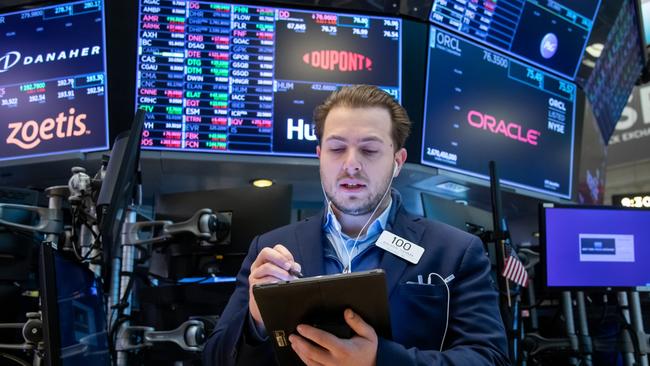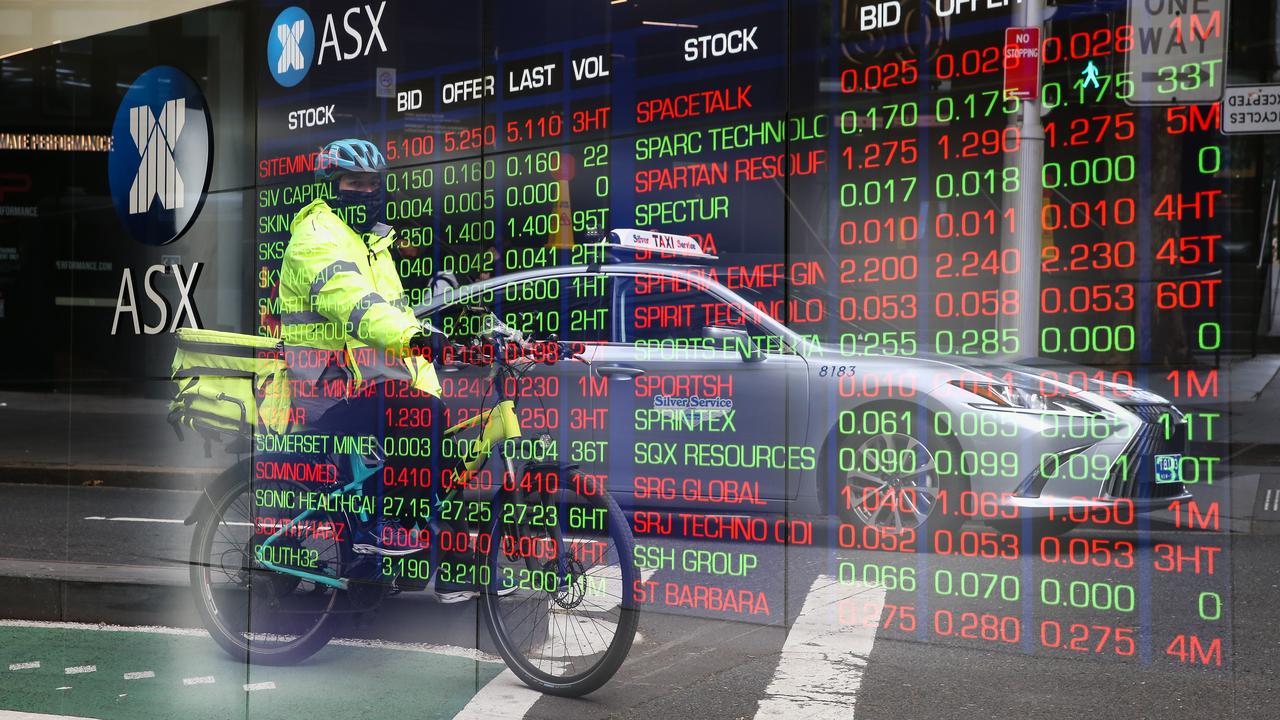Shares in strong rebound but Fed chief warns of pain to come
An exceptionally strong rise in shares on Friday reinforced perceptions that longer-term value is emerging after sharp falls.

An exceptionally strong rise in Australian shares on Friday reinforced perceptions that longer-term value is emerging after sharp falls caused by rapidly tightening monetary policy.
On its third-best day this year, the S&P/ASX 200 rose 1.9 per cent to a three-day high of 7075.1 points.
It came after the index had fallen as much as 9 per cent in the past three weeks as the resources sector succumbed to global growth fears following the start of fresh Covid lockdowns in China.
The sell-off in Australia’s market, which has outperformed since the Ukraine war and the start of US rate rises due to its resources sector and minimal exposure to expensive growth stocks, lowered the 12-month forward PE ratio of the index to a two-year low of 13.9 times.
The forward dividend yield of the index hit a two-year high of 4.8 per cent before franking credits.
“Shares are likely to see continued short-term volatility as central banks continue to tighten to combat high inflation, the war in Ukraine continues and Chinese Covid lockdowns impact,” said AMP Capital’s head of investment strategy and chief economist, Shane Oliver.
“However, we see shares providing reasonable returns on a 12-month horizon as the global recovery ultimately continues, profit growth slows but remains solid and interest rates rise but not to onerous levels, at least not for the next year.”
Offshore markets also rebounded after Federal Reserve chairman Jerome Powell reiterated that additional 50-basis-point rate rises at the next two Fed meetings would be “appropriate” if the economy performed as expected, and the Fed was not “actively considering” a larger 75-basis-point increase.
After a big intraday bounce in the US market on Thursday, S&P 500 futures were up 0.9 per cent and Nasdaq 100 futures were up 1.3 per cent in Friday’s Asia-Pacific session.
The optimism rubbed off on Asian markets, with Japan’s Nikkei 225 up 2.6 per cent, the Shanghai Composite up 0.8 per cent, the Hang Seng up 2.4 per cent and South Korea’s KOSPI up 2.1 per cent.
Mr Powell’s comments, together with a comment from San Francisco Fed president Mary Daly that there was no reason to alter the course of 50-basis-point increases at the next two meetings, appeared to push back against recent comments from other Fed board members calling for more aggressive rate moves.
But the Fed chief also said: “If things come in better than we expect, then we’re prepared to do less. If they come in worse than we expect, then we’re prepared to do more.”
The Fed still aimed to achieve a “soft landing”, where inflation returns to its 2 per cent target but employment remains strong, but that would be “quite challenging” and “will include some pain”.
“The question whether we can execute a soft landing or not, it may actually depend on factors that we don’t control,” Mr Powell said, regarding the Ukraine war and supply chain bottlenecks.
But to “get inflation back under control” was his main priority, Mr Powell told Marketplace radio, aligning himself with comments on inflation by President Joe Biden earlier in the week.
Friday’s strong rise may set the local market up for a fall on Monday unless Wall Street takes off. Attention next week turns to the minutes of the Reserve Bank’s May board meeting on Tuesday, the March quarter wage price index on Wednesday and April labour force data on Thursday.
“Powell signals the FOMC’s intent to push ahead with 50-basis-point hikes at the June and July meetings and the committee’s lack of control in delivering a soft landing due to supply-side problems means it is firmly in constrain-demand mode,” said Stephen Innes, managing partner at SPI Asset Management.
“I’m surprised to see the market rally to the extent it did, with no sign of a Powell put (option) for the next few meetings. However, by suggesting ‘there will be some pain’, and if I am reading the tea leaves correctly, the Powell put is still lingering somewhere in the background but more likely on the terminal rate side rather than on the S&P 500 line in the sand.”
Meanwhile, Citi strategists said global investors should “hedge against a further derating of equities”. The US investment bank said easy monetary policy – especially QE – inflated all financial markets. But now that QE was being withdrawn, real yields were rising and risk assets, such as equities, were derating.
Citi’s chief global equity strategist, Robert Buckland, said the relationship with global quantitative easing by central banks suggested real bond yields could reach 1 per cent, “which would be bearish for equities”.
Global 12-month rolling asset purchases by central banks peaked above $5 trillion, driving real yields into negative territory during the Covid crisis.
Global equity markets “may remain vulnerable even if 10-year TIPS (Treasury Income Protected Securities) stop rising, and real rates are more likely to hit a hawkish 1 per cent real yield than fall to a dovish -0.5 per cent scenario, according to Citi strategists.
“The hawkish outcome would suggest a further derating in the MSCI AC World benchmark, from 15 to 14 times,” Buckland said. “The MSCI US would drop from a PE of 18 to 16 times” and “the implied derating of the MSCI AC World Growth index to 17 from the current 22 times “would be more painful”.
Buckland told clients to construct a global equity portfolio to hedge against a further derating of equities by minimising exposure to rising real interest rates.
“To do this, we go short trades where valuations are most sensitive to US 10-year TIPS yields,” he says. “We go long those trades that are least sensitive. “At a regional level, this favours the UK and emerging markets over the US and continental Europe.
“It favours the MSCI AC World value over growth index.”
“At a sector level, it favours UK and EM financials and commodity sectors.
“It is wary of growth sectors, especially in the US.”





